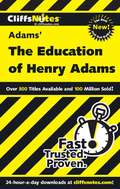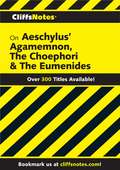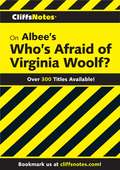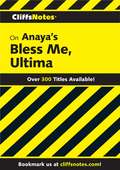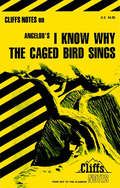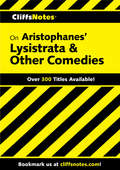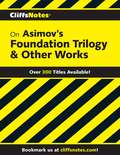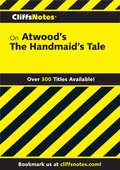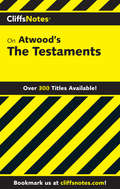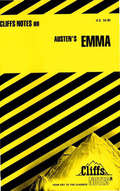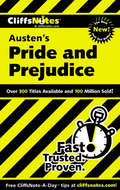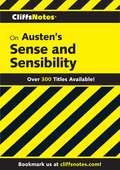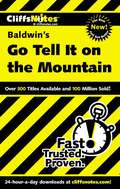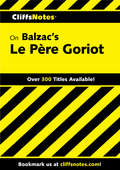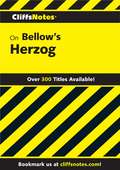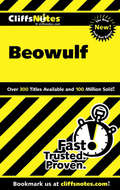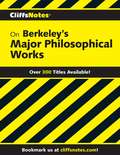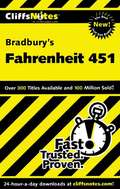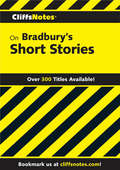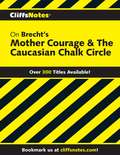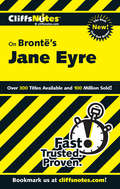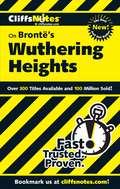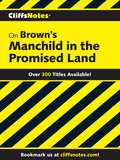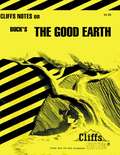- Table View
- List View
CliffsNotes on Adams' The Education of Henry Adams
by Stanley P. BaldwinThe original CliffsNotes study guides offer a look into critical elements and ideas within classic works of literature. The latest generation of titles in this series also features glossaries and visual elements that complement the classic, familiar format.CliffsNotes on The Education of Henry Adams explores the focal character's boyhood world through the voice of Henry Adams as a man in his late 60s. Speaking in third person, the narrator treats the younger Henry objectively, which establishes the style of the book.Following Henry's lifelong protests of the limitations of formal education, this study guide provides summaries and commentaries for each of 35 chapters within what has been termed "experimental literature" and an outstanding work of nonfiction. Other features that help you figure out this important work includeA look at the author's personal background, selected writings, and reputationIntroduction to the work, with a synopsis and character mapCharacter analyses and critical essaysReview questions, suggested essay topics, and practice projectsResource Center with books, articles, and Web sites that can help round out your knowledgeClassic literature or modern-day treasure -- you'll understand it all with expert information and insight from CliffsNotes study guides.
CliffsNotes on Aeschylus' Agamemnon, The Choephori & The Eumenides
by Robert J MilchThis CliffsNotes guide includes everything you've come to expect from the trusted experts at CliffsNotes, including analysis of the most widely read literary works.
CliffsNotes on Albee's Who's Afraid of Virginia Woolf?
by James L. RobertsThis CliffsNotes guide includes everything you've come to expect from the trusted experts at CliffsNotes, including analysis of the most widely read literary works.
CliffsNotes on Anaya's Bless Me, Ultima
by Ruben O. MartinezThis CliffsNotes guide includes everything you've come to expect from the trusted experts at CliffsNotes, including analysis of the most widely read literary works.
CliffsNotes on Angelou's I Know Why the Caged Bird Sings
by Mary RobinsonThe original CliffsNotes study guides offer expert commentary on major themes, plots, characters, literary devices, and historical background. The latest generation of titles in this series also feature glossaries and visual elements that complement the classic, familiar format. Piqued by a dare, Angelou wrote this first book as an exercise in autobiography as art -- and succeeded. Her novel is a story of the difficulties of black women and the eventual victory of spirit that comes from being a soulful fighter. CliffsNotes on I Know Why the Caged Bird Sings helps you explore this tale of rebirth, self-worth, and dignity. This concise supplement helps you understand the overall structure of the novel, actions and motivations of the characters, and the social and cultural perspectives of the author. Features that help you study include A close look at the author's life which offers insight into her writing A list of characters and their descriptions Summaries and commentaries, chapter by chapter Critical assessments of the novel and the television movie adaptation Glossaries to help you fully understand the novel Critical essays on women in the novel and Southern Fundamentalism A review section that tests your knowledge, and suggested essay topics Classic literature or modern modern-day treasure -- you'll understand it all with expert information and insight from CliffsNotes study guides.
CliffsNotes on Aristophanes' Lysistrata & Other Comedies
by Gary K Carey James L RobertsThis CliffsNotes guide includes everything you’ve come to expect from the trusted experts at CliffsNotes, including analysis of the most widely read literary works.
CliffsNotes on Asimov's Foundation Trilogy & Other Works
by L. David AllenThe original CliffsNotes study guides offer expert commentary on major themes, plots, characters, literary devices, and historical background--all to help you gain greater insight into great works you're bound to study for school or pleasure. In CliffsNotes on Asimov's Foundation Trilogy and Other Works, you explore the American author's original three Foundation books, the three Empire novels, The End of Eternity, and The Gods Themselves. The Foundation Trilogy, written between 1951-53 is celebrated science fiction writer Isaac Asimov's most famous work. In the three-book series, he portrays the ruin and rebirth of a futuristic interstellar empire. In this study guide, you'll find Life and Background on the Author, Introduction to Asimov's Science Fiction, and Critical Commentaries on Foundation, Foundation and Empire, and Second Foundation, plus a look inside the following other titles by this prolific writer:Pebble in the SkyThe Stars, Like DustThe Currents of SpaceThe End of EternityThe Gods ThemselvesClassic literature or modern-day treasure--you'll understand it all with expert information and insight from CliffsNotes study guides.
CliffsNotes on Atwood's The Handmaid's Tale
by Mary Ellen SnodgrassThe original CliffsNotes study guides offer expert commentary on major themes, plots, characters, literary devices, and historical background. The latest generation of titles in this series also feature glossaries and visual elements that complement the classic, familiar format.In CliffsNotes on The Handmaid's Tale, you come to realize that for every utopia, there's a corresponding dystopia. This tale of a bleak future depicts a time where women are valued only for their reproductive capacities. While this cautionary tale of repression and totalitarianism is horrifying, there are moments of poetic warmth and humor. It is a brilliant satire.This concise supplement to Atwood's The Handmaid's Tale helps you understand the overall structure of the novel, actions and motivations of the characters, and the social and cultural perspectives of the author. Features that help you study include Chapter-by-chapter summaries and commentariesA timeline of critical events that leads to the climax of the novelA character map that graphically illustrates the relationships among the charactersCritical essays on women's roles in the novel, and the use of literary devices, themes, and settingsA review section that tests your knowledgeClassic literature or modern modern-day treasure -- you'll understand it all with expert information and insight from CliffsNotes study guides.
CliffsNotes on Atwood's The Testaments
by Curry KennedyThe perfect reading companion to Margaret Atwood's The Testaments, this literature guide delves into the themes and characters and will enhance your reading experience of this anticipated sequel to The Handmaid's Tale that book clubs have been waiting for!
CliffsNotes on Austen's Emma
by Thomas J RountreeThe original CliffsNotes study guides offer a look into key elements and ideas within classic works of literature. CliffsNotes on Emma explores a satiric novel that stabs at manners and social classes, all the while delivering entertainment in a mild comic tone and sharing a lesson for the moralist. Following the heroine's slow and bumpy growth from self-deception to self-knowledge, this study guide provides summaries and commentaries on each chapter within the three-volume plot structure. Other features that help you figure out this important work include Life and background of the author Introduction to and synopsis of the novel Critical analysis of plot, setting, point of view, characters, theme, and style Review questions and selected bibliography for further research Classic literature or modern-day treasure -- you'll understand it all with expert information and insight from CliffsNotes study guides.
CliffsNotes on Austen's Pride and Prejudice
by Marie KalilThe original CliffsNotes study guides offer expert commentary on major themes, plots, characters, literary devices, and historical background. The latest generation of titles in the series also feature glossaries and visual elements that complement the classic, familiar format.In CliffsNotes on Pride and Prejudice, Jane Austen's most popular and well-known work, you'll meet Elizabeth Bennet and her sisters as they navigate the social milieu of provincial 18th-century England. In addition to easy travels through all of the novel's ironic plot twists, you'll get detailed plot summaries and chapter-by-chapter commentaries to show you how Austen's belief in rationalism triumphs in the union of Elizabeth and Mr. Darcy. You'll also discoverLife and background of the author, Jane AustenA character map that graphically illustrates the relationships among the charactersCritical essays about women's roles in 19th-century Britain and moneyA review section that tests your knowledgeA Resource Center with books, Web sites, and films for further studyClassic literature or modern modern-day treasure -- you'll understand it all with expert information and insight from CliffsNotes study guides.
CliffsNotes on Austen's Sense and Sensibility
by Norah SmaridgeThis CliffsNotes guide includes everything you’ve come to expect from the trusted experts at CliffsNotes, including analysis of the most widely read literary works.
CliffsNotes on Baldwin's Go Tell It on the Mountain
by Sherry Ann McnettThe original CliffsNotes study guides offer expert commentary on major themes, plots, characters, literary devices, and historical background. The latest generation of titles in this series also feature glossaries and visual elements that complement the classic, familiar format.CliffsNotes on Go Tell It on the Mountain explores the Great Migration, a time in American history characterized by a mass exodus of African Americans from the rural south to northern cities.Follow the simple story of a young boy coming of age, a tale that gains complexity as it interweaves with the experiences of his mother, father, and aunt. This concise supplement to James Baldwin book about religion, racism, and familial expectations features summaries and commentaries on each part within the novel. Other features that help you study includeBackground on the authorDescriptive character map and analysesCritical essays on racism, the church, and homosexuality as a subtextAn interactive quiz, plus suggested essay questions and practice projectsClassic literature or modern modern-day treasure — you'll understand it all with expert information and insight from CliffsNotes study guides.
CliffsNotes on Balzac’s Le Père Goriot
by Pierre F. LimouzyThis French realist novel contrasts the social progress of an impoverished but ambitious aristocrat with the tale of a father, whose obsessive love for his daughters leads to his personal and financial ruin.This concise supplement to Honoré de Balzac's Le Père Goriot helps students understand the overall structure of the work, actions and motivations of the characters, and the social and cultural perspectives of the author.
CliffsNotes on Bellow's Herzog
by Ronald L LycetteThis CliffsNotes guide includes everything you’ve come to expect from the trusted experts at CliffsNotes, including analysis of the most widely read literary works.
CliffsNotes on Beowulf
by Stanley P. BaldwinThe original CliffsNotes study guides offer expert commentary on major themes, plots, characters, literary devices, and historical background. The latest generation of titles in this series also features glossaries and visual elements that complement the classic, familiar format. CliffsNotes on Beowulf takes you into the epic story of warriors and strange beasts. Beowulf is considered to be the longest and greatest surviving Anglo-Saxon poem. Some see it as an early celebration of Christianity. Others think it extols - or perhaps condemns - heroic values. Step into this epic poem and get ready for sword fights, feasts, and treasures. With this study guide, you'll be able to follow all of the action as you consider the artistic impact of the work. You'll also gain insight into the characteristics of the unknown poet and the manuscript itself. Other features that help you study include: * Character analyses of major players. * A character map that graphically illustrates the relationships among the characters. * Critical essays. * A review section that tests your knowledge. * A Resource Center full of books, articles, films, and Internet sites. Classic literature or modern modern-day treasure -- you'll understand it all with expert information and insight from CliffsNotes study guides.
CliffsNotes on Berkeley's Major Philosophical Works
by Charles H. PattersonThis CliffsNotes guide includes everything you've come to expect from the trusted experts at CliffsNotes, including analysis of the most widely read literary works.
CliffsNotes on Bradbury's Fahrenheit 451
by Kristi HinerThe original CliffsNotes study guides offer a look into key elements and ideas within classic works of literature. The latest generation of titles in this series also features glossaries and visual elements that complement the familiar format.CliffsNotes on Fahrenheit 451 explores a twenty-fourth century world in which books are considered evil because they inspire people to think and to question.Following the story of a 30-year-old fireman who's spent the last decade destroying books for a living, this study guide features a graphical map to show how the novel's characters relate to one another. In addition, CliffsNotes provides character analyses that take you deeper into the minds and mechanical workings of Ray Bradbury's famous social criticism Other features that help you figure out this important work includePersonal background on the authorSynopsis of the book and a look at major themesSummaries and commentaries on each part of the bookReview section that features multiple-choice questions, quoted passages, and suggested essay topics and practice projectsResource Center with books, articles, and Web sites that can help round out your knowledgeClassic literature or modern-day treasure -- you'll understand it all with expert information and insight from CliffsNotes study guides.
CliffsNotes on Bradbury's Fahrenheit 451
by Kristi HinerThe original CliffsNotes study guides offer a look into key elements and ideas within classic works of literature. The latest generation of titles in this series also features glossaries and visual elements that complement the familiar format.CliffsNotes on Fahrenheit 451 explores a twenty-fourth century world in which books are considered evil because they inspire people to think and to question.Following the story of a 30-year-old fireman who's spent the last decade destroying books for a living, this study guide features a graphical map to show how the novel's characters relate to one another. In addition, CliffsNotes provides character analyses that take you deeper into the minds and mechanical workings of Ray Bradbury's famous social criticism Other features that help you figure out this important work includePersonal background on the authorSynopsis of the book and a look at major themesSummaries and commentaries on each part of the bookReview section that features multiple-choice questions, quoted passages, and suggested essay topics and practice projectsResource Center with books, articles, and Web sites that can help round out your knowledgeClassic literature or modern-day treasure -- you'll understand it all with expert information and insight from CliffsNotes study guides.
CliffsNotes on Bradbury's Short Stories
by Audrey Smoak ManningThis CliffsNotes guide includes everything you've come to expect from the trusted experts at CliffsNotes, including analysis of the most widely read literary works.
CliffsNotes on Brecht's Mother Courage & The Caucasian Chalk Circle
by Denis M. CalandraCliffsNotes on Bertolt Brecht's plays Mother Courage and The Caucasian Chalk Circle.
CliffsNotes on Brontës Jane Eyre
by Mary Ellen Snodgrass Karin JacobsonThe original CliffsNotes study guides offer expert commentary on major themes, plots, characters, literary devices, and historical background. The latest generation of titles in this series also feature glossaries and visual elements that complement the classic, familiar format. Question Victorian -- and present-day -- society as you study Charlotte Bronte's popular novel with CliffsNotes on Jane Eyre. What is women's position in society? What is the relationship of dreams and fantasy to reality? What is the basis of an effective marriage? Bronte tackles all these questions and more through the story of her heroine Jane Eyre. CliffsNotes provides detailed plot summaries, critical commentaries, and a helpful character map to help you uncover all the insight this novel has to offer. Make your study of this timeless novel a success with CliffsNotes on Jane Eyre. Other features that help you study include Character analyses of major players Critical essays A review section that tests your knowledge Background on the author, including career highlights Classic literature or modern modern-day treasure -- you'll understand it all with expert information and insight from CliffsNotes study guides.
CliffsNotes on Bronte's Wuthering Heights
by Richard P WasowskiThe original CliffsNotes study guides offer expert commentary on major themes, plots, characters, literary devices, and historical background. The latest generation of titles in this series also feature glossaries and visual elements that complement the classic, familiar format. In CliffsNotes on Wuthering Heights, you explore one of Emily Brontë most beloved and enduring novels, combining realism and gothic symbolism to tell a love story that's full of social relevance. In the novel, you follow the self-destructive journey of Heathcliff, as he seeks his revenge for losing his childhood love, Catherine, to another man. This study guide carries you through Heathcliff's life by providing summaries and commentaries on each chapter of the novel. Critical essays give you insight into the narrative structure of the novel, the major themes Brontë explores, and Heathcliff's obsession. Other features that help you study include Character analyses of the main characters A character map that graphically illustrates the relationships among the characters A section on the life and background of Emily Brontë A review section that tests your knowledge A Resource Center full of books, articles, films, and Internet sites Classic literature or modern modern-day treasure -- you'll understand it all with expert information and insight from CliffsNotes study guides.
CliffsNotes on Brown's Manchild in the Promised Land
by William M. Washington Jr.This CliffsNotes guide includes everything you’ve come to expect from the trusted experts at CliffsNotes, including analysis of the most widely read literary works.
CliffsNotes on Buck's The Good Earth
by Stephen V HuntleyThe original CliffsNotes study guides offer a look into key elements and ideas within classic works of literature.CliffsNotes on The Good Earth explores author Pearl S. Buck’s insight into the lives of the Chinese people, particularly the peasant population.Following the story of a Chinese farmer who represents the universal cultivator – one who knows that his riches and security come from the good earth itself, this study guide provides summaries and critical commentaries for each chapter within the novel. Other features that help you figure out this important work includePersonal background on the authorIntroduction to and synopsis of the bookIn-depth character analyses for the two principal figures, Wang Lung and wife O-LanCritical essays on the Chinese practices of foot binding and concubinageReview section that features interactive questions and suggested essay topicsClassic literature or modern-day treasure — you'll understand it all with expert information and insight from CliffsNotes study guides.
